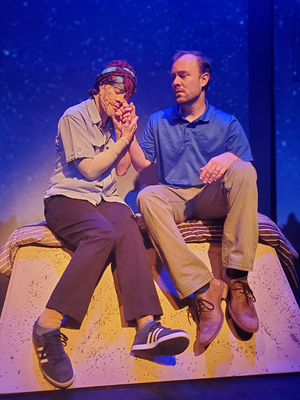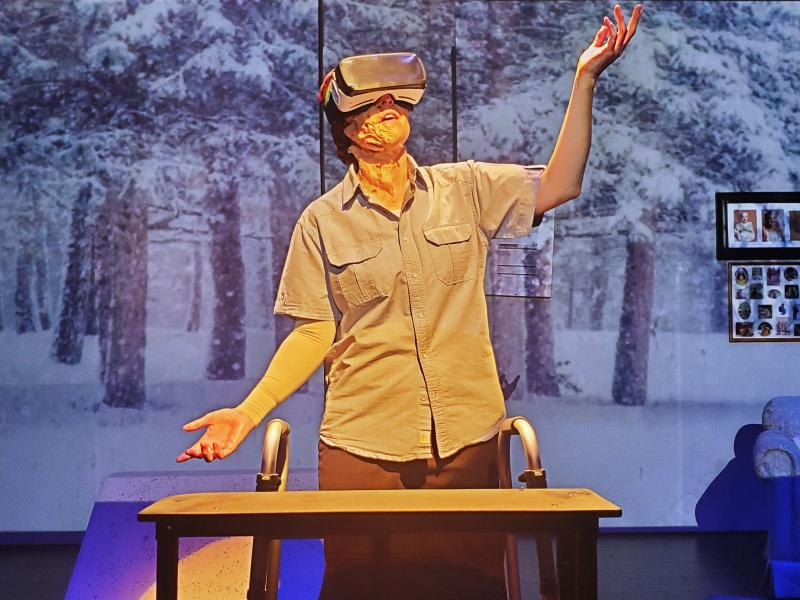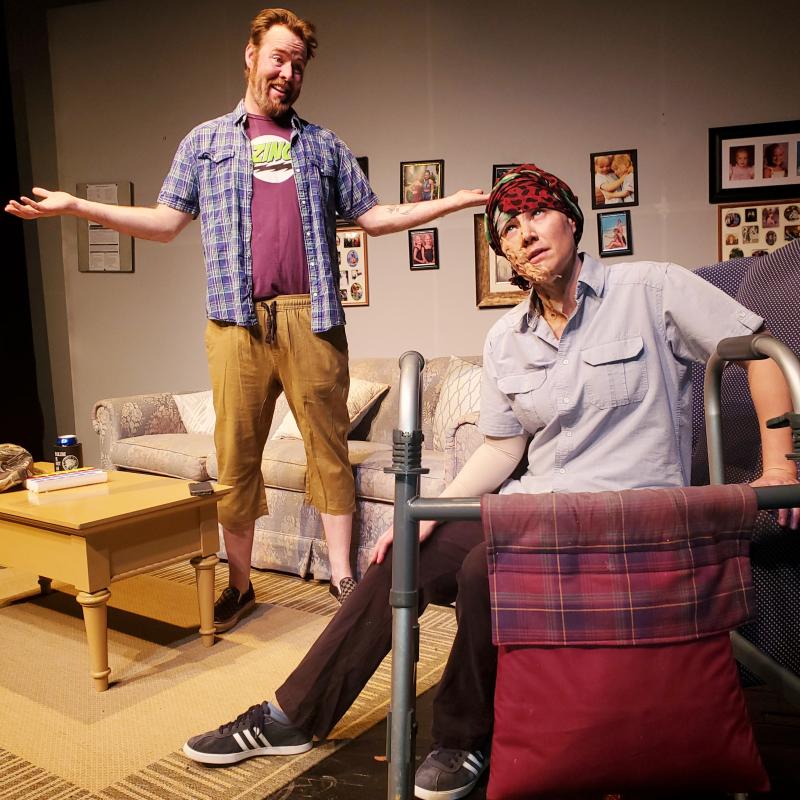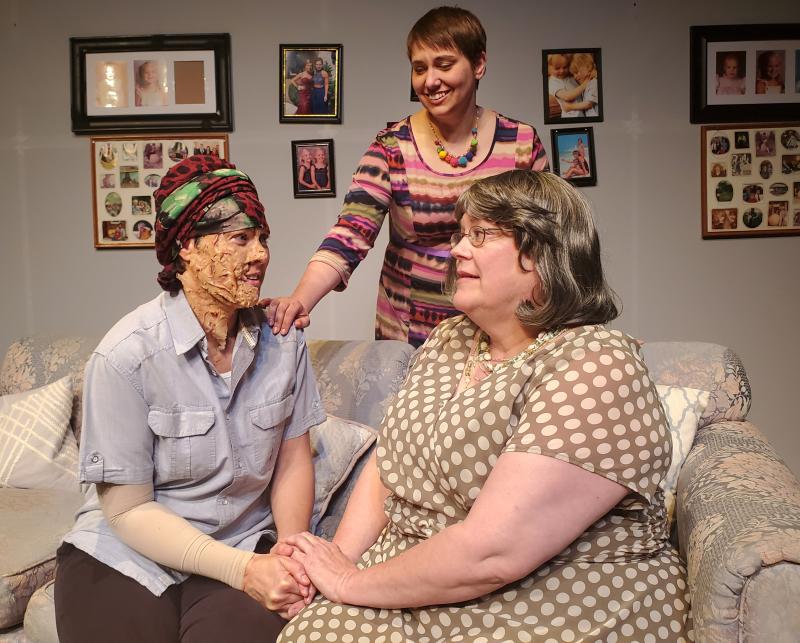Review: A Disfigured War Vet Struggles to Find – and See – Herself in UGLY LIES THE BONE

When Jess returns to her Florida hometown from her third deployment in Afghanistan, there are multiple obstacles littering her path to reintegrating into family and community life. Mentally, she's suffering from PTSD. Physically, she's tormented by the aftereffects of injuries inflicted by an exploding IED: she gets around - slowly - with help from a walker, her face is disfigured by burns and skin grafts, and she's constantly in excruciating pain from burns and grafts all over her body.
That's just the beginning in Lindsey Ferrentino's UGLY LIES THE BONE, now at Spirit Square in a Three Bone Theatre production. There's a certain amount of friction between Jess and her sunny sister, Kacie, that reads like ingratitude for all the help and care Kacie is trying to give her. Jess also reflexively despises Kacie's vulgar, tactless, and boisterous boyfriend, Kelvin, and she doesn't express that feeling daintily. Nor does it help that Jess's former boyfriend, Stevie, didn't religiously wait for her to come back home. Instead, he went on with his life and got married.
Located near Cape Kennedy, Jess's hometown of Titusville offers additional challenges. Not only do the sands on the nearby beaches trigger Jess's PTSD, so will the earthshaking tremors from rocket launches at the Kennedy Space Center. True, NASA's space shuttle program is about to end, minimizing the obstacles posed by future launch events. But layoffs have already struck the Space Center, reducing job opportunities in the citywide. Stevie was one of the impacted NASA workers, and Jess finds him behind the counter at a local gas station, making change, selling lottery cards, and wearing a dopey space beanie.
But wait a second. Jess had to run and conquer obstacle courses just to earn the dubious privilege of being deployed to Afghanistan in the first place, right? This nasty, bitter, and disfigured woman has grit. We also get hints from both Kacie and Stevie that, once upon a time, Jess had vitality and appeal. And notwithstanding all her current pain, disability, and orneriness, Ugly Jess gets meaningful help.

The most intriguing - and theatrical - form of help is a form of VR therapy that Ferrentino tells us, in a program note, was actually the inspiration for her play. You can google "Snow World" therapy and find that its use with severely injured soldiers dates back to 2008, though it seemed pretty cutting-edge to me. Each time Andrea King as Jess puts on her VR goggles and immerses herself in a fabricated 3D snow-world, the Duke Energy Theater fills with dreamy projection designs by Ryan Maloney - so we're fairly immersed as well.
Since the theory of the therapy is as much sensory bombardment as fantastical escape, the second ingredient of the treatments is music. Jess gets to choose between patriotic soldiering music and Paul Simon. The treatment is curiously impersonal: we never see Jess's therapist; we only hear her voice. Amid the sensory overload, Jess's sufferings subside sufficiently for the therapist to prompt her to move her legs through the snowdrifts and lift her arms - movements that would normally exacerbate her terrible pain by stretching her newly grafted skin.
For us as well as for Jess, these dreamy cinematic episodes are oases of calm that punctuate the stresses and occasional comedy of her readjustment to civilian life. She momentarily abandons her walker as she grabs the videogame controls, almost straightens up, and we find ourselves relaxing with her in the dimmed light.

Perverse as it was, I enjoyed the oafishness of Peter Finnegan as Kelvin and the nerdiness of Scott Tynes-Miller as Stevie. Anyone who saw Finnegan last summer as he feasted on the role of Bottom in the outdoor production of A Midsummer Night's Dream at Queens University will need no further incentive to behold his Kelvin, which is nearly that far south of normal. And who better for director Dee Abdullah to turn to than Tynes-Miller for the wishy-washy, conflicted, and adorably humbled Stevie? We've watched his auditions for years.
Abdullah can allow both Finnegan and Tynes-Miller to go slightly overboard in making asses out of Kelvin and Stevie because Ferrentino eventually brings them back to conscience and virtue. Becky Schultz as Jess's sister Kacie may seem too wholesome at first to go the distance with Kelvin. With only a trace of trashiness from Schultz, Finnegan's loutishness startles us all the more, so we tend to empathize with Jess a little bit when she explodes on him early - and later on when she harbors darker suspicions.
Before singing King's praises as Jess, I'd be remiss if I didn't insert some prefatory kudos to makeup designer Gregory Hewett and makeup artist Natasha Kay, unsparing in showing us what Jess is dealing with. You don't need to imagine much of the pain when King slowly makes her first entrance with her walker. The pain really does seem to permeate every inch of her as she struggles to move and the endure the ocean of ache. When King declares that three operations were necessary to restore one eyelid, you believe it. Vulnerability, bitterness, anger, need, and an all-powerful doggedness course through her, slackened only when Jess dons those transporting goggles, or when she joins Stevie - again in relative darkness - for their climactic rooftop rendezvous.

We get to know Debbie Swanson as the voice of the therapist strictly from her performance in a backstage booth, so it's gratifying to see her at last when she dons a gray wig and doubles as Jess and Kacie's mom as the drama concludes. Swanson's disembodied voice isn't tough love so much as clinical care for Jess at the VR sessions. Sometimes soothingly, she patiently counsels Jess to move forward instead of looking back, following procedures with firm military precision.
Eventually, the voice from the booth warms up to Jess just enough to bend the rules. All this time, even before she appears, Mom is adding to Jess's stress and our suspense. Suffering from dementia, Mom may not recognize her own daughter anymore, another devastating blow for Jess. Or she might recognize Jess and freak out, which would hurt them both.
For Jess, avoidance of that confrontation brings little relief. Looking into the mirror, Jess is struggling to recognize herself.
Reader Reviews

Videos
